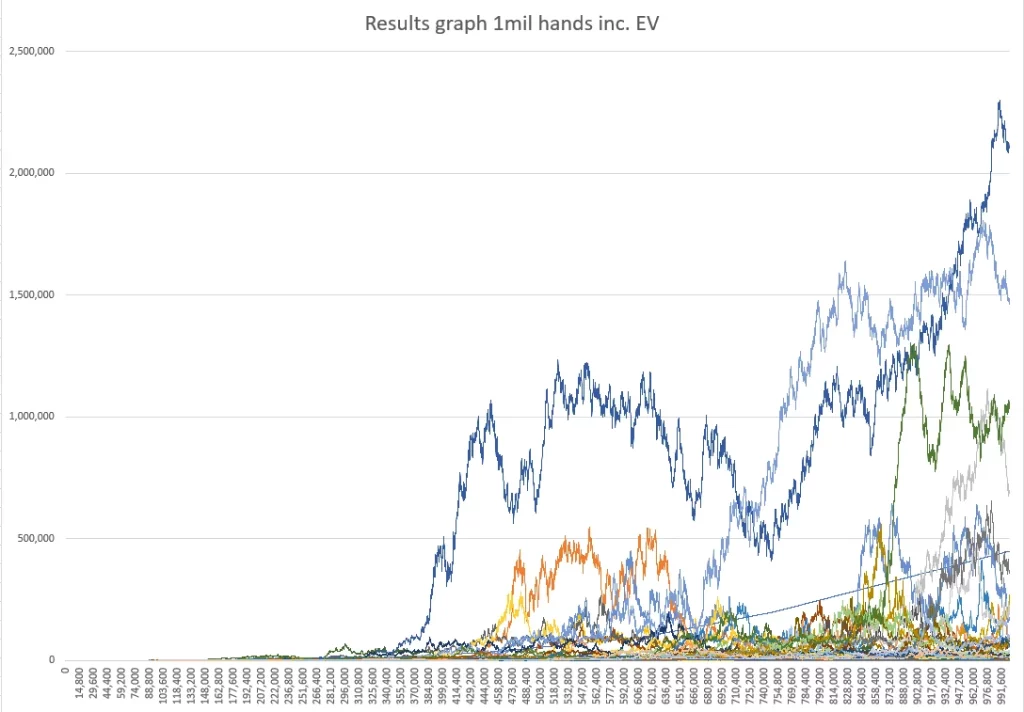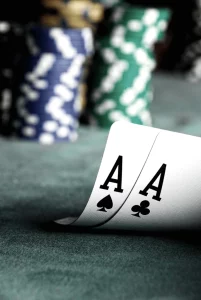Variance in Poker
In poker, every player, regardless of skill level or experience, faces the inevitable force known as variance. In my journey as a professional poker player, I have come to realize that variance is not just a challenge to overcome, but a crucial aspect of the game that shapes us. I went through long periods of variance that, while testing my resolve, taught me invaluable lessons by showing me the many mistakes I was making at the table. It was by going through these periods that I refined my strategy and strengthened my game.
Variance in poker is a complex process, a mixture of luck and probability that can make a big difference to fortunes in the short term. It’s a mathematical framework that explains ups and downs, winning streaks and seemingly endless droughts. As someone who has experienced the ups and downs that variance brings, I want to share my thoughts and experiences with you.
In the upcoming discussion, I will delve into the intricacies of variance, break down its components, and explain how it manifests itself in real-life poker scenarios. I will explore how variance affects decision making, bankroll management, and the psychological aspects of playing poker at a competitive level. By sharing my experiences, I hope to uncover the essence of variance and offer strategies to effectively manage it so that it becomes a tool for growth rather than an obstacle to success.
What is Variance in Poker
Variance is a term that describes the fluctuation between winning and losing hands, essentially quantifying the difference between expected and actual results over a period of time. It is a phenomenon that emphasizes the role of luck in the game, contrasting it with the skill and strategy of the player. As someone who has been through the rough waters of poker variance, I have a deep understanding of its nature and why it is not something to be feared.

Many players perceive variance as a harbinger of doom, a scary aspect that could mean the demise of their poker endeavors. However, this viewpoint overlooks the bigger picture. Dispersion is an integral part of poker, a testament to the complexity of the game and its dependence on both skill and luck. It is this unpredictability that gives poker its depth and fascination.
Murphy’s Law, which states that “everything that can go wrong will go wrong,” often seems particularly applicable to poker. This is not meant as a fatalistic view of the game, but rather a recognition that variance can and will affect everyone, often at the most inconvenient times. What matters is how you react to it.
I’ve learned to view variance not as an enemy, but as a teacher. During periods of high variance, I was forced to examine my game more closely, identifying mistakes and areas for improvement that I might not have otherwise noticed. It was through these adjustments and refinements that I was able to develop as a player. Deviations in this sense are not just inevitable, they are beneficial, pushing us to better understand and master the game.
There’s a quote about variance that I’ve adopted as a rule of thumb after years of playing at the poker table: “In poker, you can do everything right and still lose. But if you play the right way, the wins will come in the long run.” This phrase emphasizes the essence of variance – it’s not about short-term losses or wins, but a long-term process of honing your skills, making informed decisions, and committing to your strategy.
Preparing for variance involves a combination of mental toughness, strategic flexibility and effective bankroll management. It’s about staying calm during both highs and lows, realizing that the nature of poker means that both will inevitably occur. Accepting variance as part of the game helps to create a mentality that allows you to not just survive the fluctuations, but to use them as opportunities for growth and learning.
Why Variance Happens
Over the years of playing poker, I have encountered variance in many different forms. Understanding the causes of variance is essential for any player seeking to weather its storms and become more experienced and resilient. Dispersion, whether it can energize or challenge, is an inevitable aspect of poker for several reasons:

- Randomness. At the heart of poker is a deck of cards, a receptacle of pure randomness. Every shuffle and deal introduces a dose of randomness into the game, ensuring that no two hands are ever the same. This randomness is the basis of variance. Even the most carefully considered strategies can be overridden by the unpredictable nature of the cards that fall out. In my experience, accepting this randomness, rather than resisting it, has been the key to adapting and thriving in a fluctuating game.
- Uncertainty of opponents. Poker is equally a game of psychology and cards. Each player brings their own unique blend of tactics, proclivities and temperament to the table. This diversity creates an environment full of uncertainty. An opponent’s unexpected play, an unnoticed bluff or a deflection can all contribute to variance. Learning to read and adapt to the myriad of play styles I encountered was essential to overcoming the unpredictability inherent in the poker dynamic.
- Playing at high stakes. The higher the stakes, the greater the variance. The more money at stake, the greater the pressure and the possibility of significant fluctuations in fortune. High stakes poker tests not only your skill and strategy, but also your emotional stability. Increased tension can lead to more aggressive play, more bluffs and more dramatic turns of fortune. My experience playing high stakes poker has taught me to maintain discipline and focus – essential qualities for managing variance at this level.
- Bluffs and Play Styles. The art of bluffing and a variety of playing styles contribute significantly to variance. A well-timed bluff can turn a seemingly predictable hand into an unpredictable showdown. Similarly, the collision of different playing styles – aggressive, passive, loose or tight – creates an environment in which variance thrives. Adapting my game to counteract or exploit these elements has been an ongoing learning process that has deepened my understanding of the game and its intricacies.
How to Deal With Variance
Navigating the unpredictable variance of poker is an essential skill I’ve developed over the years at the tables. Realizing that variance is not a specter to be feared, but a reality to be prepared for, has fundamentally changed the way I approach the game. Successfully combating variance involves a multi-faceted strategy that incorporates both discipline and perspective. Here’s how I’ve learned to overcome the swings and swings of variance in poker.
Avoid excessive bluffing
Bluffing is an entire art in poker, a tool for deception and manipulation. However, excessive bluffing can amplify the effects of variance, introducing unnecessary risk into your game. I learned early in my career that judicious use of bluffing, balanced with solid, straightforward play, reduces the volatility of results. By bluffing selectively, I manage to keep variance in check, ensuring that when I bluff, it’s both spectacular and less predictable for my opponents.
Update your bankroll regularly
Bankroll management is the foundation of a successful poker strategy, especially when it comes to variance. I’ve found that regularly updating my bankroll to ensure it is strong enough to withstand the inevitable downturns is crucial. This means not just adding funds, but adjusting my play to suit my bankroll size, choosing bets that allow me to weather the storm without sacrificing financial stability. By playing within my means and maintaining a healthy bankroll, I’ve been able to stay in the game, learn and adapt despite the fluctuations.
Maintaining emotional stability
Variability tests not only your skills at the table, but also your emotional resilience. The psychological blow that slumps take can be very powerful. Developing emotional resilience has become an important part of my strategy for dealing with variance. This means accepting losses as part of the game, learning from them and not letting them affect my confidence or decision making. Celebrating wins, no matter how small, and looking at each hand as an opportunity for growth helps me stay positive, which is essential for long-term success.
Focus on the long term
One of the most valuable lessons I’ve learned is the importance of taking a long-term perspective. In the short term, the difference can seem insurmountable, a series of ups and downs, chaotic and unpredictable. However, by focusing on long-term goals and continuous improvement, I was able to see variance for what it really is: a natural part of the game. This shift in perspective has allowed me to stay true to my strategy, improving it over time and not obsessing over short-term results. Realizing that skill, patience and perseverance will ultimately prevail has been key to my growth as a player.
Conclusion
During my time playing poker, I’ve come to realize that variance is the inevitable companion of every player, from the greenest beginner to the seasoned pro. It is a phenomenon that does not discriminate and affects everyone who sits at the table. My experience has taught me that being afraid of variance is like being afraid of the ebb and flow of the tide. It is a natural part of the game that should be anticipated, respected, but not feared.
On the contrary, preparing for variance, understanding its inevitability and developing strategies to successfully overcome it has been an integral part of my development as a player. It is through the highs and lows that poker teaches the most valuable lessons, honing not only our skills but also our resilience and adaptability.
Variance, by its very nature, adds a zest to the game of poker, creating a layer of complexity that forces us to be better. It tests our strategies, our patience and our resilience, requiring a combination of skill and adaptability. To embrace variance is to embrace the very essence of poker, to recognize that in its unpredictability lies the opportunity for growth, learning and ultimately triumph.

